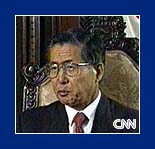Alberto Fujimori
Peruvian President
|
Born: July 28, 1938; Lima, Peru Education: Degree (agronomic engineering), Agrarian National University (La Molina), 1961; M.A. (mathematics), University of Wisconsin, 1969 Military Service: None Occupation: Agronomist Family: Wife, Susana Higuchi; 4 children Religion: Roman Catholic Early Years: Son of Japanese immigrants; Principal, Agrarian National University (La Molina), 1984-89; Host, Getting Together (television talk show). Political Career: Founded Cambio 90 political party, 1989; President, 1990- Office: Oficina del Presidente, Lima, Peru Related site: Biography of Mr. Alberto Fujimori Sources: Current Biography, 1990; Newsmakers, 1992; Who's Who in the World, 1996 |
Peruvian President |
Alberto Fujimori was born on July 28, 1938, in Lima, Peru, the son of agricultural field hands. He earned a degree in agronomic engineering at the prestigious Agrarian National University of "La Molina," graduating at the top of his class. He also earned an M.A. in mathematics at the University of Wisconsin. Fujimori returned to become dean of the faculty of sciences at "La Molina," and spent a career in academic administration.
His entry into the world of Peruvian politics began when he hosted the television talk show "Getting Together," gaining a reputation as a skillful political analyst. The media paid little attention to Fujimori and his colleagues when they put together a political party called "Change 90" for the national elections. Fujimori, the political outsider, took a grass-roots approach, visiting peasants in remote villages, and projected an image of being in touch with the average Peruvian. He won the election by 20 percent in what was seen as a protest vote against the politics of the past. Some also attributed his victory to support by black and Indian Peruvians who were put off by the opposition's tactic of playing on Fujimori's status as an immigrant and a minority.
Fujimori faced a country wracked by corruption, economic chaos, guerrilla warfare and drug trafficking. Under the previous Garcia government, Peru's gross national product had been shrinking and the inflation rate had reached 7,650 percent. The country was rich in natural resources but lacked the investment capital to use them. Fujimori instituted reforms intended to retain a free-market system and appeal to international lenders. He deregulated and decentralized the economy, cut government operating costs by 10 percent, cut tariffs, liberalized foreign exchange rates, ordered all state-owned companies to raise their prices to profitable market rates, deregulated airlines, trucking and long-distance bus travel, streamlined procedures for registering businesses and eased import restrictions. The inflation rate began to slow and, within a year, had stabilized at 139 percent.
To combat the bloody Maoist guerrilla movement the Shining Path (Sendero Luminosa), Fujimori purged from government all those who he felt hindered his policies. He dissolved the congress and suspended the national constitution, fired high-level government officials and dismissed 13 of 23 Supreme Court justices and dozens of other judges. Fujimori also armed peasants so they could fight guerrillas in the field.
He refused a U.S. offer of $36 million intended for use in drug interdiction, feeling that attacking the cocoa drug farmers would merely deprive them of their livelihood and drive them into the arms of the guerrillas. Instead he proposed to find the farmers a profitable alternative to growing cocoa.
Due to his economic policies, the economy greatly improved. The government also managed to capture the leader of the Shining Path guerrilla movement in September 1992. As a result, Fujimori was re- elected in a landslide victory on April 9, 1995.
Two recent incidents have focused attention on Fujimori and his government. A 26-year-old American woman was imprisoned in Peru and given a life sentence without hope of parole. Lori Helene Berenson of New York was convicted of treason by a Peruvian military court, which found her guilty of aiding leftist Tupac Amaru guerrillas in a plot to seize Peru's congress.
On December 17, 1996, an armed group of Tupac Amaru guerrillas seized the home of the Japanese ambassador to Peru and held as hostage hundreds of diplomats and government officials who were attending a party there. Prolonged negotiations brought the release of many of the hostages. The rebels wanted the release of several hundred rebel comrades held in Peruvian prisons.
On April 22, amid gunfire and explosions, 140 Peruvian commandos stormed the compound and freed the remaining 71 hostages. One hostage, two soldiers and all 14 rebels were killed during the attack.
Critics have accused the Fujimori administration of creating secret courts and tribunals that fail to give defendants due process, in which defense lawyers may not cross-examine witnesses or challenge key evidence. Critics also charge that Fujimori has not done enough to curb the military's human rights' violations.
